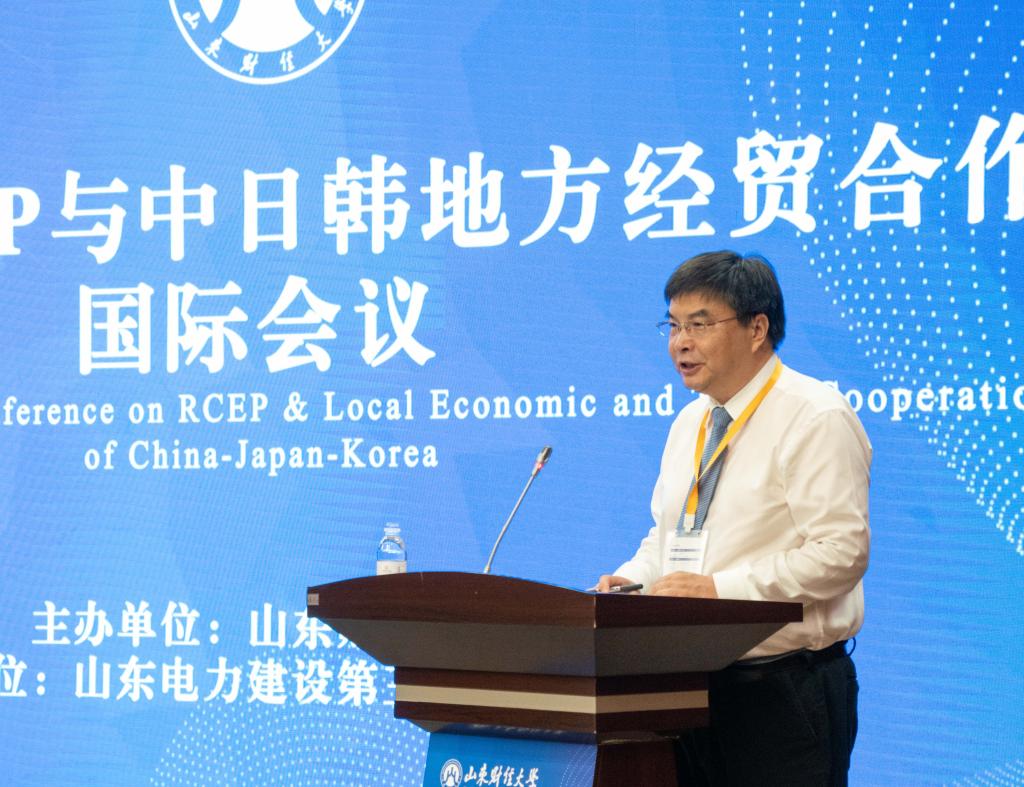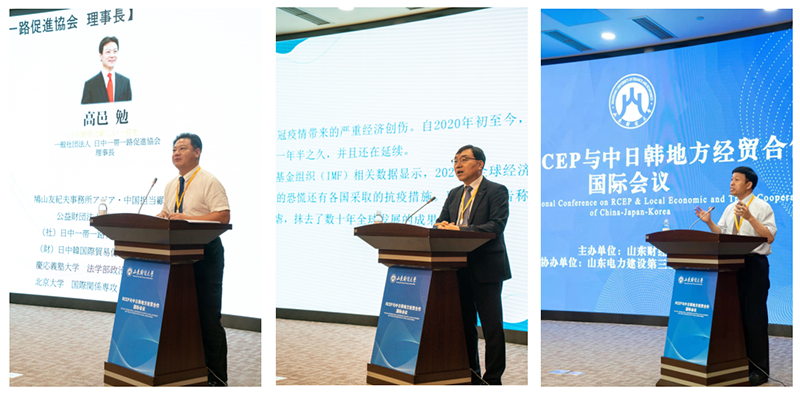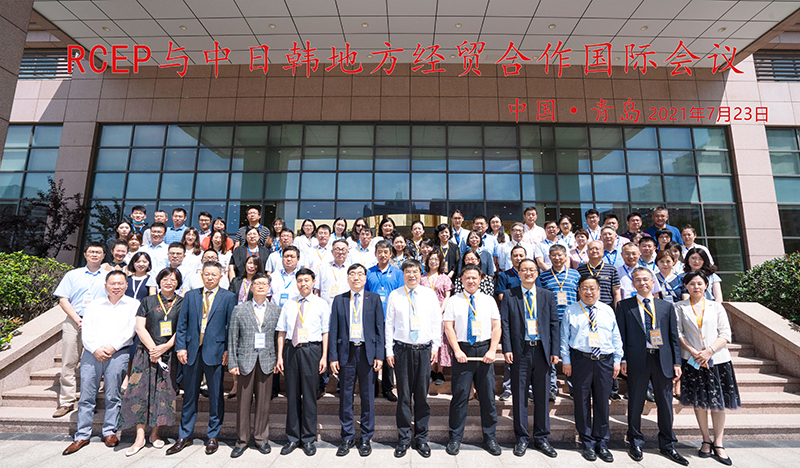On July 22-24, the International Conference onPlease spell out RCEP(RCEP) and China-Japan-Korea Local Economic and Trade Cooperation was held in Qingdao. Takamura Tsutomu(たかむらつとむ、), Chairman of Japan-China Belt and Road Promotion Association, Hong Zhangpiao(홍장피아오), General Representative of the Greater China Region of Korea Trade and Investment Promotion Commune, Zou Zhibo, Deputy Director of Institute of World Economics and Politics, Chinese Academy of Social Sciences, Wang Li, General Manager of SEPCO 3 Electric Power Construction Corporation (SEPCO 3) attended and addressed the meeting. Lee Sang-hoon (이상훈), Beijing Chief Representative of Korea Institute of Foreign Economic Policy, Jiang Yongsheng, Chief Representative of Korea Exchange Beijing, Luo Lin, Dean of National and Regional Research Institute of Beijing Language and Culture University, Gao Hong, President of the Chinese Society of Japan, Zhang Jifeng, Executive Vice President of the Japanese Economic Association in China, Zhao Changjun, Deputy Director of the Research Office of the People's Government of Eastern Province, Chen Tong, Secretary General of Provincial Council for the Promotion of International Trade and other leaders and professionals attended the meeting. The meeting was presided over by Zhao Zhongxiu, thePresidentof SDUFE and the dean of the China-Japan-Korea Research Institute.

Zhao Zhongxiu pointed out that to deeply implement Xi Jinping's diplomatic thoughts and promote the construction of a new highland in Shandong, Shandong University of Finance and Economics (SDUFE) established the China-Japan-Korea Research Institute in November 2020. At present, the China-Japan-Korea Research Institute has been approved as the “National and Regional Research Recording Center for Universities of the Ministry of Education”, “Shandong Foreign Affairs Research and Development Think Tank”, and “Shandong Province and Specific Countries/Regions Exchange and Cooperation Research Center”.He stressed that, as the world’s fastest growing region with the most development potential, RCEP will accelerate the reconstruction of the global economic structure and international economic and trade rules, which will greatly enhance the level of economic integration in East Asia, and promote regional economic growth.In order toaccelerate the implementation of RCEP, and better serve the major projects of replacing the old driving force withthe newin Shandong Province and the construction of opening-up to the outside world, SDUFE organized this conference to actively explore the profitable opportunities brought by RCEP and comprehensively deepen the exchanges and cooperation among Shandong province,Japan and South Korea and contribute wisdom for opening-up and cooperation in Northeast Asia in a new era.
Takamura Tsutomu stressed that, “2022 is the 50th anniversary of the normalization of diplomatic relations between China and Japan and the 30th anniversary of the establishment of diplomatic relations between China and South Korea.” It is hoped that China, Japan and South Korea will firmly seize this historic opportunity and continue to deepen friendship and expand cooperation. He also read out the congratulatory letter sent by former Japanese Prime Minister Yukio Hatoyama to the meeting.In the congratulatory letter, Yukio Hatoyama stated that “local exchanges play an irreplaceable role in enhancing friendship and promoting cooperation.” It is hoped that China and Japan will continue to deepen exchanges and cooperation, jointly promote the construction of the China-Japan Belt and Road Initiative, and contribute to world peace and sustainable development. Hong Zhangpiao said in his speech that in this era of intertwined and resonant epidemics and changes, local exchanges are facing both a “collective test” and an “important opportunity.” In the face of the great changes unseen in a centuryina post-epidemic era, we must firmly grasp the historical opportunity of RCEP, expand cooperation fields, innovate cooperation models, and promote the recovery of the world economy. Zou Zhibo said in his speech that RCEP will help create a new pattern of integration of trade, economy, social culture, and political security. Qingdao holds an important position in the future development pattern of Northeast Asia. RCEP will further enhance Qingdao’s pivotal role in Japan, South Korea, China, and Euro-Asian cooperation.

After the opening ceremony, five experts and scholars gave keynote reports. In his report, Lee Sang-hoon explained in detail the economic benefits brought about by the signing of RCEP agreement, pointing out that RCEP is an opportunity to enhance the economic cooperation among China, Japan and South Korea, and is of great significance to the signing of the world’s largest “Super FTA”. Jiang Yongsheng gave a detailed introduction to the status quo of the Korea Exchange from different perspectives, and proposed that new paths for Sino-Korea capital market cooperation can be explored in areas such as joint development of related indexes, facilitating cross-border investment and bond market cooperation.Luo Lin elaborated on the status quo of China-Japan and China-Korea bilateral economic and trade relations and China-Japan-Korea multilateral cooperation, and pointed out that RCEP will promote the deep integration of regional industrial chains, supply chains and value chains, and help China form a new development pattern of “dual cycles”.Dong Yan, director of the International Trade Research Office of the Institute of World Economics and Politics at the Chinese Academy of Social Sciences, deeply explored the opportunities and challenges RCEP brings to the economic and global value chain restructuring of various countries, and emphasized the need to practice new development concepts and make full use of RCEP to promote East Asian economic integration.Liu Luhao, an associate professor at the School of International Economics and Trade of SDUFE, listed the factors that led to the fluctuations in the use of foreign capital from Japan and South Korea in Shandong from long-term, short-term and internal levels, location and policy, and put forward countermeasures and suggestions.
On the afternoon of the 23rd, two sub-seminars were held. At the sub-venue of “China, Japan and South Korea Humanities Exchange Mechanism”, Gao Hong, Zhang Jifeng, and Professor Nishimura Yusaku of the Institute of International Economics of the University of International Business and Economics and other participating experts gave reports on “China, Japan and Korea Humanities Exchange and Cooperation”, pointing out that to promote the cooperation of the three countries, we must emphasize methods, avoid vicious competition and zero-sum games, and use RCEP as an important starting point for realizing complementary regional advantages, advocate culture as a platform for economic performance, and contribute to the construction of the Asia-Pacific economic circle under the new situation.In the sub-venue of “Opportunities, Mechanisms and Countermeasures for Economic and Trade Cooperation between Shandong, Japan and Korea under the RCEP Framework”, experts and scholars such as Zhao Changjun, Chen Tong, and Quan Chunhuan, President of the Asian Trade Association, emphasized the content of RCEP and analyzed the impact and influence of RCEP on the Asian regional value chain. The economic effects of the establishment of the free trade zoneopen possibilities foradvice and suggestions for building an advanced manufacturing base and deepening regional economic and trade cooperation among Shandong, Japan and South Korea.

The conference was co-organized by the International Exchange and Cooperation Office, the School of International Economics and Trade, the School of Foreign Languages, and the China-Japan-Korea Research Institute, and EPCO 3 Electric Power Construction Corporation. More than 90 people from the Chinese Academy of Social Sciences, the Provincial Council for the Promotion of International Trade, Qingdao City, representatives of some universities and enterprises inside and outside the province, and leaders and experts from relevant departments and colleges of SDUFE attended the meeting.


